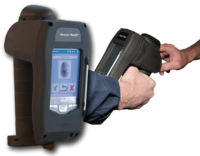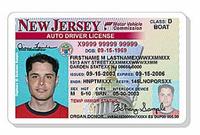-
Biometrics for Indian cabs
Officials at India’s New Delhi International Airport will soon begin using biometrics to monitor taxi drivers; the move comes after a Saudi businessman was abducted and murdered by two cab drivers in 2008
-
-
New tools identify a person's expression, estimate their mood

Biometrics company releases software that allows users to “cartoonize” photos; cartoons aside, the company announced the release of more free API (application programming interface) face detection tools: the service can identify a person’s expression as well as estimate their mood
-
-
Better than SecurID?
The man who invented the two-factor authentication SecurID token has just unveiled a more secure authentication system using voice biometrics; Kenneth Weiss, the founder of Universal Secure Registry, says his latest invention is more flexible and secure than SecurID tokens as they can be used to authenticate individuals on mobile phones, payments, and cloud computing; by adding a voice biometric component, the new device offers three-factor authentication
-
-
Wireless fingerprint readers help police fight crime

Using a new wireless device, police across the country are now able to quickly and accurately identify a suspect in the field; using RapID, a small handheld unit, officers can read a suspect’s fingerprint and check it against a database for any matches; if any matches are found the device will pull up the person’s real name, date of birth, gender, and race, making it more difficult for criminals to use a false identity
-
-
NYU hospital unveils new biometric palm readers for patients
The NYU Langone Medical Center recently unveiled its new biometric palm readers to verify patients; using technology called PatientSecure, a biometric reader will scan a patient’s palm using an infrared light to create a unique map of their veins; this information is then stored in a database and linked to their electronic health record system ensuring accuracy and virtually eliminating the need for paperwork
-
-
Popeye's gets serious about fraud, implements biometric system
Today, Sailormen, Inc., the largest Popeye’s franchise with 148 locations across seven states including Florida, Missouri, and Alabama, announced that it is deploying biometrics at their restaurants to improve employee accountability, increase sales, and reduce fraud; the Popeye’s franchise will use DigitalPersona’s U.are.U fingerprint readers to verify manager overrides and to track an employee’s hours
-
-
Philippines mandate biometric registration for voters
Lawmakers in the Philippines recently passed a law that would require all voters to register their biometric data before they are eligible to participate in national elections; voters who fail to register before the filing deadline will be stricken from the voter rolls, but will have the opportunity to reactivate their status once they register
-
-
Brazilian bank explores online biometric ID
Bradesco, one of Brazil’s largest banking and insurance companies, is studying if it can identify account holders online using biometrics to ensure the safest transactions possible; the bank is currently working with Fujitsu to develop a device that is capable of identifying customers at home; the bank currently uses Fujitsu’s PalmSecure biometric palm reader in its ATMs
-
-
Malaysia's biometric failure
A malfunction in Malaysia’s biometric fingerprint system at its international railway station could have major implications as other countries expand the use of biometrics at ports of entry; last Saturday travelers were infuriated after they were forced to wait nearly an hour and a half to pass through Malaysia’s immigration checkpoints; many tourists had to change or cancel their holiday travel plans all together; the delays came at the height of Malaysia’s tourist season, resulting in sharp criticism from the tourist industry
-
-
Gait biometrics still walking the walk
Research on gait biometrics at the University of Southampton, a pioneer in researching this biometric technology, has passed another landmark with the first public demonstration of the technology’s ability to withstand deliberate spooking; the technology is being perfected at the university’s Biometric Tunnel, in which data from twelve cameras is combined and processes to produce an individual “signature” of a person’s walk that is unique and recognizable with over 90 percent accuracy
-
-
Portable iPod Touch fingerprint scanner launched
IPod Touch users can now turn their devices into a portable fingerprint scanner; last week, Fulcrum Biometrics unveiled its new FbF mobileOne biometric fingerprint reader and software for the iPod touch; using the Touch’s standard dock connector, the mobileOne device can scan and match fingerprints on the iPod or send it wirelessly to a remote server for authentication
-
-
States turning to new "familial DNA" tests, practice faces legal hurdles
Law enforcement officials in several states across the United States are hoping to obtain the legal authority to begin conducting “familial DNA” testing, a process which could greatly increase the number of suspects identified in violent crimes; while DNA is often found at crime scenes using familial DNA would allow law enforcement officials to use DNA from a suspected criminal’s relatives to positively identify them; currently only California and Texas have laws in place that allow investigators to conduct familial DNA tests; Virginia, Pennsylvania, and Florida could soon join their ranks; the practice is still quite new and faces legal challenges and must be approved by a state’s courts
-
-
New Jersey launches sophisticated new driver's license

In compliance with Secure ID, the federal law that mandates that states create more stringent identification cards, New Jersey has unveiled a sophisticated new driver’s license; according to New Jersey officials, the new Enhanced Digital Driver’s License puts New Jersey among the ten states with the most secure identity cards; to prevent counterfeiting, security features include an embedded pattern on the license, one and two dimensional bar codes, and “purposeful errors” like misspellings; to implement these new licenses, the state’s MVCs have had to undergo a $19 million upgrade to install new computer systems, hardware, and software
-
-
Arizona police deploy iris scanners and facial biometrics to identify inmates
Local police departments in Arizona have begun using facial biometrics and iris scanning technology to identify inmates and registered sex offenders; officers with the Pinal County Sheriff’s department have entered roughly 1,500 inmates and 700 sex offenders into a national database to better identify, register, and track inmates; the scans come as part of a broader effort led by the National Sheriff’s Association (NSA) and the U.S. Justice Department; beginning in 2009, the Justice Department awarded $500,000 to help roughly forty-five law enforcement agencies throughout the United States to purchase iris scanners from BI2 Technologies
-
-
Malaysia begins fingerprinting all visitors
Under a new trial program, next month the government of Malaysia will begin scanning the fingerprints of all travellers entering and exiting the country to help combat international crime and terrorism; the program, dubbed the Biometric Fingerprint Security System, is aimed at reducing fraud from the current screening method which involves a security official matching a traveller’s face to their passport photo; 3 percent of the 24.4 million foreigners who visited Malaysia last year were involved in crimes; biometric scanners are currently being installed at sixty-one of Malaysia’s ninety-six ports of entry, and the trial program will begin 1 June
-
- All
- Regional
- Water
- Biometrics
- Borders/Immig
- Business
- Cybersecurity
- Detection
- Disasters
- Government
- Infrastructure
- International
- Public health
- Public Safety
- Communication interoperabillity
- Emergency services
- Emergency medical services
- Fire
- First response
- IEDs
- Law Enforcement
- Law Enforcement Technology
- Military technology
- Nonlethal weapons
- Nuclear weapons
- Personal protection equipment
- Police
- Notification /alert systems
- Situational awareness
- Weapons systems
- Sci-Tech
- Sector Reports
- Surveillance
- Transportation
Advertising & Marketing: advertise@newswirepubs.com
Editorial: editor@newswirepubs.com
General: info@newswirepubs.com
2010-2011 © News Wire Publications, LLC News Wire Publications, LLC
220 Old Country Road | Suite 200 | Mineola | New York | 11501
Permissions and Policies
Editorial: editor@newswirepubs.com
General: info@newswirepubs.com
2010-2011 © News Wire Publications, LLC News Wire Publications, LLC
220 Old Country Road | Suite 200 | Mineola | New York | 11501
Permissions and Policies
